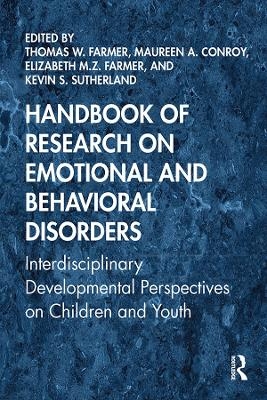
Handbook of Research on Emotional and Behavioral Disorders
Routledge (Verlag)
978-1-138-32071-0 (ISBN)
Although there has been a concerted focus on developing evidence-based programs and practices to support the needs of children and youth with emotional and behavioral disorders, there has been less emphasis on the developmental, social, and environmental factors that impact the implementation and effectiveness of these approaches. Chapters from leading experts tackle this complexity by drawing on a range of disciplines and perspectives including special education; mental health services; school, clinical, and community psychology; social work; developmental psychology and psychopathology; and prevention science.
An essential resource for scholars and students interested in emotional and behavioral disorders, this volume crafts an essential framework to promote developmentally meaningful strategies for children and youth with even the most adverse experiences and intensive support needs.
Thomas W. Farmer is Professor and Chair of the Department of Psychology in Education at the University of Pittsburgh. Maureen Conroy is Co-Director of the Anita Zucker Center for Excellence in Early Childhood Studies, and the Anita Zucker Endowed Professor of Early Childhood Studies at the University of Florida. Elizabeth M.Z. Farmer is Professor and Dean of the School of Social Work at the University of Pittsburgh. Kevin Sutherland is Professor of Counseling and Special Education at Virginia Commonwealth University.
Section 1: Developmental Processes and Timing 1. The Development, Prevention, and Treatment of Emotional and Behavioral Disorders: An Interdisciplinary Developmental Systems Perspective 2. Epidemiology of Emotional and Behavioral Disorders 3. Prevention and Intervention in Preschool and Early Elementary School Years 4. Developmental Processes and Emotional and Behavioral Disorders during the Middle and High School Years 5. The Transition to Adulthood: A Critical Developmental Period within a Changing Social-Contextual Landscape Section 2: Targeting Social Processes and Environmental Ecologies 6. Interaction-Centered Model of Language and Behavioral Development 7. Peer to Peer Support: Innovative Strategies for Families of Youth with Emotional/Behavioral Disorders 8. The Family Check-Up: Building on Family Strengths to Promote Child Wellbeing 9. Classroom Peer Ecologies and Cultures, and Students with EBD: Social Dynamics as Setting Events for Intervention 10. Violence Prevention 11. Interventions for Youth Who Experience Trauma and Adversity 12. Strengthening Social Processes to Support Youth with Emotional and Behavioral Difficulties: An Ecological, Public Health Approach in Afterschool Programs Section 3: Selected Effective Programs and Practices 13. The Family Check-Up for Elementary and Middle School Youth and Families Emotional/Behavioral Disorders 14. Multi-Tiered Systems of Support 15. BEST in CLASS: A Tier-2 Program for Children with and At-Risk for Emotional/Behavioral Disorders 16. An Adaptive, Correlated Constraints Model of Classroom Management: The Behavioral, Academic, and Social Engagement (BASE) Program 17. Multi-tiered Social-Emotional Learning: PATHS and Friendship Group in the Fast Track Program 18. Checking the Connections between Effective Interventions for Students with Emotional/Behavioral Disorders 19. Multisystemic Therapy for High-Risk Youth 20. Treatment Foster Care: Providing Out-of-Home Treatment in Community- and Family-Based Environments 21. Residential Programs: Opportunities and Challenges in the 21st Century Treatment Environment 22. Managing and Adapting Practice 23. Best Practices for Prescribing and Deprescribing Psychotropic Medications for Children and Youth 24. The Homework, Organization, and Planning Skills (HOPS) Intervention 25. The Daily Report Card Intervention: Summary of the Science and Factors Affecting Implementation 26. Cognitive-Behavioral Prevention and Intervention Approaches to Student Emotional and Behavioral Functioning 27. School-based Mental Health Section 4: Preparing and Supporting the EBD Workforce 28. Leveraging Implementation Science and Practice to Support the Delivery of Evidence-Based Practices in Services for Youth with Emotional and Behavioral Disorders 29. Preparing Diverse Professionals 30. Leading the Team for Youth with Emotional and Behavioral Disorders: Special Educators as Intervention Specialists 31. Professional Development to Support Service Providers of Children and Adolescents with or At-risk of Emotional and Behavioral Disorders: Issues and Innovations
| Erscheinungsdatum | 16.04.2020 |
|---|---|
| Zusatzinfo | 17 Tables, black and white; 26 Line drawings, black and white; 26 Illustrations, black and white |
| Verlagsort | London |
| Sprache | englisch |
| Maße | 178 x 254 mm |
| Gewicht | 866 g |
| Themenwelt | Sachbuch/Ratgeber ► Gesundheit / Leben / Psychologie |
| Geisteswissenschaften ► Psychologie ► Pädagogische Psychologie | |
| Medizin / Pharmazie ► Medizinische Fachgebiete ► Psychiatrie / Psychotherapie | |
| Sozialwissenschaften ► Pädagogik ► Didaktik | |
| Sozialwissenschaften ► Pädagogik ► Sonder-, Heil- und Förderpädagogik | |
| ISBN-10 | 1-138-32071-4 / 1138320714 |
| ISBN-13 | 978-1-138-32071-0 / 9781138320710 |
| Zustand | Neuware |
| Informationen gemäß Produktsicherheitsverordnung (GPSR) | |
| Haben Sie eine Frage zum Produkt? |
aus dem Bereich


